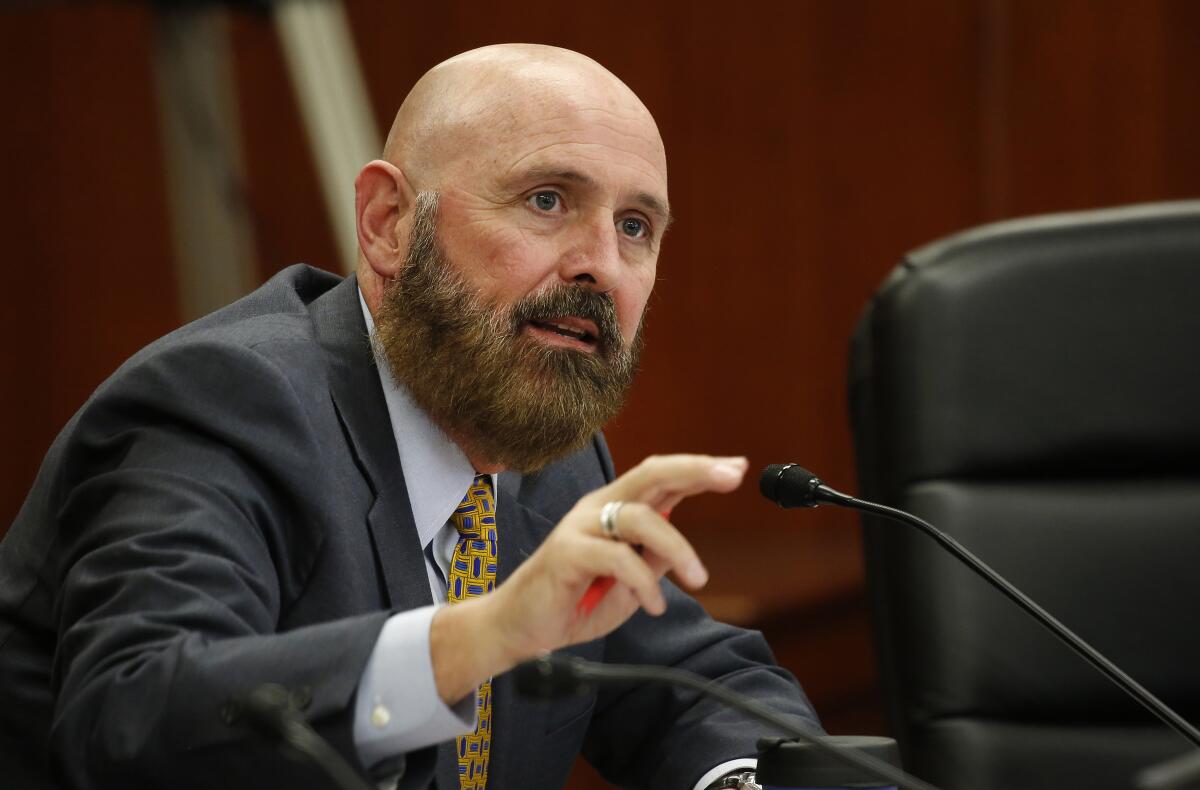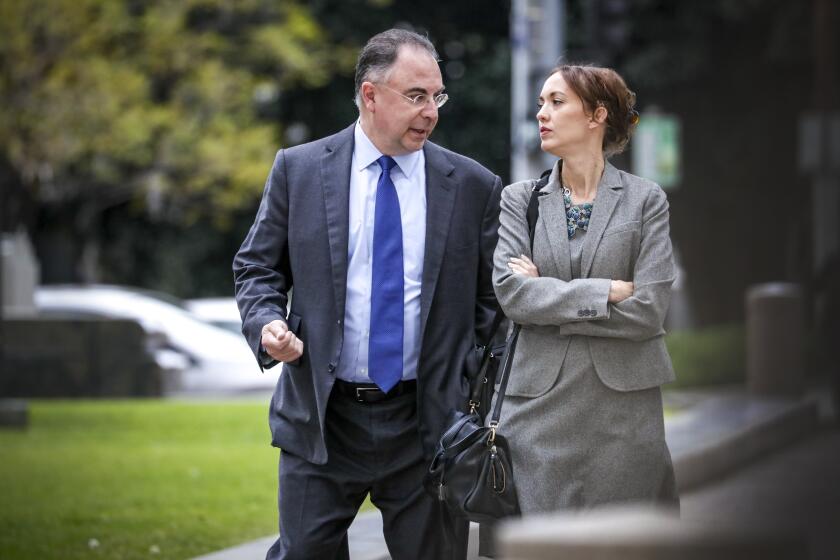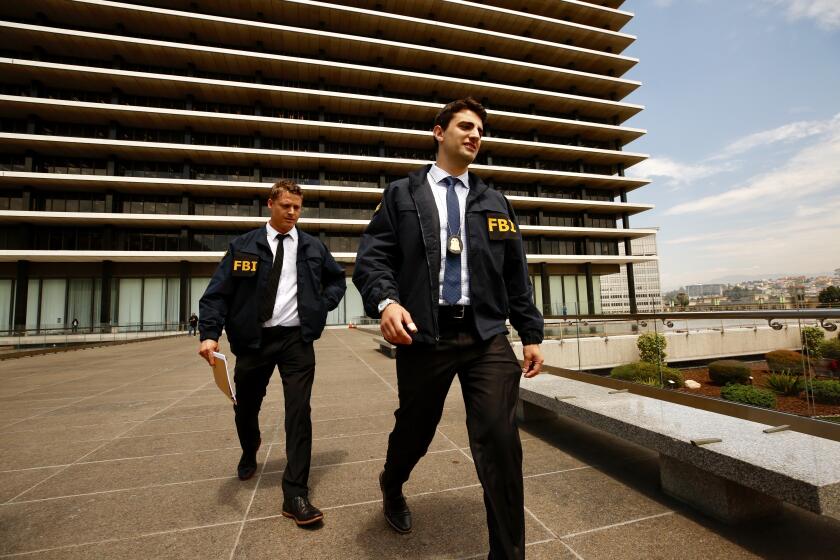Former head of DWP agrees to plead guilty to bribery charge

- Share via
The former top executive of the Los Angeles Department of Water and Power has agreed to plead guilty to a bribery charge in a widening corruption case involving the utility and City Atty. Mike Feuer’s office, prosecutors said Monday.
David H. Wright, 62, of Riverside accepted bribes from a lawyer in exchange for supporting a $30-million, no-bid DWP contract, officials said. Wright also admitted in the plea agreement that he participated in several other corrupt schemes while serving as head of the DWP.
Paul Paradis, the attorney whose company received the contract, agreed last week to plead guilty to one count of bribery in a scheme that involved him receiving a $2.2-million kickback from another attorney. Paradis was “covertly cooperating” with the FBI by late March 2019, prosecutors said Monday.
The FBI raided the DWP and the city attorney’s office in July 2019, prompting Mayor Eric Garcetti to remove Wright from his job.
In his plea agreement, Wright admitted he took part in a conspiracy to commit bribery and wire fraud, solicited bribes, destroyed evidence and knowingly made false statements to FBI agents and federal prosecutors.
Anthony Pacheco, Wright’s attorney, did not respond to a request for comment.
The agreement lays out how Wright, selected by Garcetti as the DWP’s general manager in 2016, developed a close relationship with Paradis. A New York attorney, Paradis had been hired by the city attorney’s office to sue PricewaterhouseCoopers, the consulting company that worked on the launch of a new DWP billing system.
Paul Paradis, an attorney who was hired by City Atty. Mike Feuer’s office, has agreed to plead guilty to one count of bribery in a case growing out of the LADWP’s 2013 billing scandal.
That DWP billing launch was a disaster, resulting in hundreds of thousands of customers receiving faulty bills.
The agreement says Wright and Paradis met in February 2017 at a hotel restaurant in Riverside and discussed Paradis’ intent to create a new company, Aventador Utility Solutions LLC, for the purpose of seeking a lucrative contract with the DWP.
Wright and Paradis “worked together to select the company’s name, ‘Aventador,’ which was the name of a model of the luxury car company Lamborghini,” according to the plea agreement.
Wright would ensure that the DWP’s five-member Board of Commissioners awarded the contract without competitive bidding, the agreement states. In exchange, Paradis would name Wright the chief executive of Aventador following Wright’s retirement from the utility, with Wright earning a salary of $1 million.
“Wright and Paradis further discussed the need to keep their agreement confidential, because they knew that it was illegal,” the agreement says.
Wright worked with Paradis and an unnamed “senior executive of LADWP” to “draft and hone” the letter urging the the DWP Board of Commissioners to approve the contract, according to the agreement.
At the June 2017 board meeting, Wright didn’t disclose to board members his plans to work at Aventador upon his retirement, the agreement states.
The pair also collaborated in other ways. After the two traveled to Israel in 2018, Wright and Paradis hatched a plan to bring a cyber company to L.A., the agreement says. Paradis would put up $5 million in capital and have a controlling interest, and Wright would have an ownership interest.
Wright told Paradis that the DWP would purchase five years of cybersecurity training at the franchise facility for $3 million a year.
The Times previously reported that Aventador planned to operate a company focused on cybersecurity in downtown Los Angeles, according to a March 2019 proposal for a contract Aventador sought with the Southern California Public Power Authority, whose members include a dozen utilities.
In March 2019, Wright learned that Paradis had been forced to resign from his work for the city in the PricewaterhouseCoopers case. That came after the consulting firm’s attorneys revealed that Paradis had a conflict because he also represented the lead plaintiff in the class-action lawsuit brought against the DWP over the billing errors.
About that time, the DWP board also canceled the $30-million contract.
In March 2019, during a meeting at his home, Wright told Paradis that he “feared that their relationship and their corrupt plans for Aventador would be discovered,” according to the agreement.
Wright directed Paradis to “destroy their incriminating text messages and emails” from Wright’s cellphone and Apple iCloud, the agreement states. Wright told Paradis that he had already gone through his office at the DWP and “destroyed all incriminating physical evidence,” the agreement states.
By then, Paradis was cooperating with the FBI, according to prosecutors.
The details of the complicated case involving L.A.’s Department of Water and Power make for a mess that’s not easy to clean up.
Wright’s plea agreement also describes an encounter in April 2019 in a downtown cafe where Paradis left a paper bag with a “wiped phone and a burner phone” for Wright.
“As they had agreed before the encounter, defendant Wright entered the cafe and saw Paradis seated near the back with a paper bag on the table. Defendant Wright gave a prearranged signal, and Paradis left the bag on the table and walked to the restroom,” the agreement says. Wright then took the bag and left, according to the agreement.
In April 2019, Wright also urged the DWP board to award a new contract valued at more than $10 million to Aventador’s successor company, Ardent. Wright didn’t disclose to the board that the Ardent company “would benefit him financially,” the agreement states. Throughout April and May 2019, Wright requested from Paradis a “substantial sign-on” bonus of $600,000, and an increase in his interest in the company, the agreement states.
Wright was voluntarily interviewed by the FBI in June 2019, where he falsely stated that he did not have any financial or business interest, including a future financial or business interest, in any companies affiliated with Paradis, the agreement states.
Wright faces up to 10 years in prison, prosecutors said.
Bill Funderburk, a former board member who voted on the Aventador agreement, has also been linked to the alleged bribery scheme involving the no-bid contract. Funderburk’s attorney denied wrongdoing by his client and Funderburk hasn’t been charged.
More to Read
Sign up for Essential California
The most important California stories and recommendations in your inbox every morning.
You may occasionally receive promotional content from the Los Angeles Times.
















